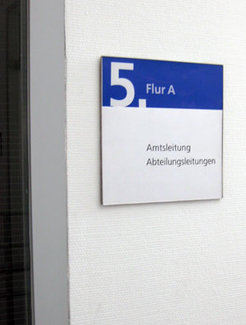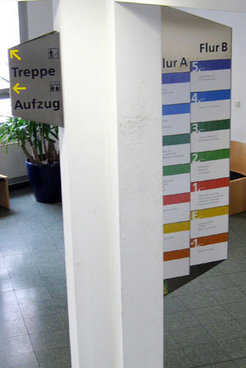Anthropology on the threshold. Ethnographic infiltration of a public organisation
by Boris Nieswand
It took more than seven months until I got field access as an ethnographer to the Jugendamt (youth department) of a large German city (cf. January Research_Blog). Surprisingly as soon as I entered the interior of the organisation the diffuse aloofness turned into a remarkable openness and sympathy for my research project. Depending on the side of the threshold – separating the inside from the outside of the organisation – on which I was positioned the perception of the examined organisation profoundly changed.

I was already so frustrated that I seriously thought about changing my field of research when a former staff member of the Jugendamt gave me important advice about how I could efficiently achieve access. I should first assure the informal agreement of a director of one of the neighbourhood counselling centres of the Jugendamt where I intended to do fieldwork. Afterwards, he recommended that I should formally approach a chief executive of the Jugendamt and to communicate to him the cooperative attitude of his colleague. This advice took into account the complicated decision-making situation in which I was in. As long as the responsibility remained in between the headquarter of the Jugendamt and its branch office nobody decided on my request because without the informal admission of the director of the neighbourhood centre the chief executive of the Jugendamt could not formally agree to my request and without the formal permission of a chief executive the director of the neighbourhood centre could not allow me to do fieldwork. After applying the advice of my informant it took only a few weeks until I received an invitation for an interview with Mr. Sparrow*, the chief executive whom I contacted, and Mr. Robin*, the director of the neighbourhood centre.

From Mr. Sparrow’s perspective, the main problem was that I asked for a far-reaching access to a counselling centre but described my research agenda only in relatively abstract social science terms. As a chief executive it is his area of responsibility to protect the Jugendamt against scandalisation of their work, which is, in particular in cases of child protection, a constant threat for the organisation. However, the abstractness of my research interest was not a mere deficiency but was related to the self-understanding of ethnography. Ethnography is based on a heuristics of ignorance which means that a field should be approached in a broad and unprejudiced way. Instead of emphasizing the strengths of one’s own ‘expert knowledge’ from which the participants in the field could or should profit, ethnographers describe themselves as students who want to learn from the ‘experts in the field’. As I experienced in the case of the Jugendamt, organisations in Western societies react as irritated when being approached in this way.
After Mr. Sparrow and I carefully scanned each at the beginning of the interview, I came to understand his concern and assured him that it would be part of my professional self-understanding to approach and represent my field of study in a respectful way. He replied: “I see you got my point. I do not want to impede an open discussion about our work but what is important for me is a fair treatment.”
Obviously, Mr. Sparrow’s main goal was neither to understand my research project in its own terms nor to regiment my work in his terms but to make his concerns transparent to me and, thereby, to involve me in the responsibility for the protection of the Jugendamt’s interests. However, it was not fixed in a written form what a “fair treatment” means or how I would be sanctioned in the case of noncompliance. Our agreement aimed at achieving commitment not control.

As a director of a neighbourhood counselling centre, Mr. Robin was responsible for efficiently employing its labour force. Since it was clear that I would create extra work, he had to identify some benefits of my activities which could legitimise my presence. I proposed to organize a workshop with them. Unfortunately, Mr. Robin’s understanding of benefit was much more concrete than mine. When he recognized that I ran into trouble in defining a concrete benefit of my work for the counselling centre he succoured me. He mentioned that he read in my CV that I had written my doctoral thesis on Ghanaian migrants. Since they have several clients of Ghanaian origin, my expertise could be of relevance for their practical work. However, Mr Robin did not attempt to achieve a formal agreement or to define concrete services I was supposed to deliver.
Generally, the low level of bindingness of our agreements becomes only comprehensible if we take into account that the reputation of the Max Planck Society already implied some confidence in the integrity of my work and that the invitation to the interview itself was a signal that the participants already implicitly agreed to engage in the ‘adventure’ of letting an anthropologist ‘infiltrate’ their organisation. By granting me field access, Mr. Sparrow and Mr. Robin jointly took over responsibility for my work within the organisation. In the case criticism they would have to justify their decision. Therefore the situation was not so much about, as I thought, negotiating the point whether I was allowed to start my research or not but they offered me a deal: Mr. Sparrow and Mr. Robin granted me field access und reciprocally I committed myself to respect two sensitive issues in eyes of the Jugendamt: (1) not wilfully to create problems and (2) not to waste their public resources for nothing. By making their concerns transparent they shared their responsibilities for the observance of these points me. Signalling my understanding for and my compliance with their concerns was an interaction ritual I had to go through before I could pass the threshold of the Jugendamt. But what this meant and how my research developed will be the subject for another research blog…














